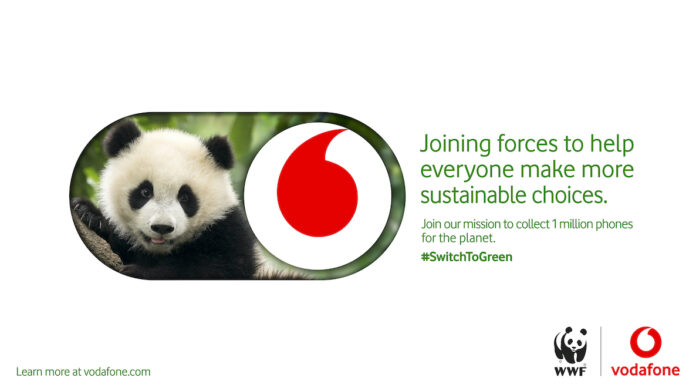Charity donation aims to impress a million people
Vodafone has enrolled the help of the World Wildlife Fund (WWF) to encourage people to recycle their phones into a greener circular economy. Its new one million phones for the planet scheme is one gear in its drive to reach ‘net zero’ carbon emissions target by 2040 by ditching the burden of electronic equipment wastage (e-waste).
The one million phones for the planet campaign is a bid to energise and refine Vodafone’s circular economy strategy by increasing the number of traded-in, refurbished and recycled devices. Buying a refurbished smartphone saves around 50kg of CO2e (Carbon Dioxide Equivalent), according to Vodafone’s figures. Using an old phone is 87% less polluting than buying a newly manufactured model. By its own admission, the practice of not pushing customers to renew each contract with a smart phone would stop each mobile operator from consuming 76.9 Kg of raw materials, according to a lifetime assessment study commissioned by the Agence De la Transition Ecologique (ADAME) in France.
Vodafone claims the programme, which starts on November 22, will inspire its customers in Europe and Africa to donate their old devices to social causes as part of a trade in when they renew their contracts. Each phone collected will see WWF conservation projects across the world get around one pound’s worth of financial support from Vodafone. Vodafone will harness WWF’s global network of expertise in environmental issues and international capability for leading the fight against the climate and nature emergency.
The One million phones for the planet scheme will run alongside existing device campaigns including Germany’s One For One appeal and the Vodafone UK’s Great British Tech Appeal. The new scheme is summarised under four headings: Trade in; refurbish and resell; repair; recycle. Vodafone said it will give easy access to competitively priced trade-in offers. The refurbished smartphones will go on offer to other customers. The life of existing devices will be prolonged by a ‘comprehensive’ programme of insurance and repairs and redundant devices will be recycled ‘to charity’.
Some critics might point out that mobile operators and phone makers have colluded for years in a ‘planned obsolescence’ economy. Now that we know the costings for each step of this supply chain, the public will be able to calculate the price that the industry’s e-waste has exacted on the environment. However, Vodafone says it now believes business success should not come at a cost to the environment and is committed to reducing the impact of its activities. Vodafone’s digital networks and technologies will be a key enabler in addressing climate change by saving energy, using natural resources more efficiently and creating a more circular economy.
“WWF and Vodafone strongly believe that we can all make greener choices about how we use technology,” said Vodafone CEO Nick Read, “Our partnership with WWF will create new initiatives to encourage our customers to take actions that reduce pressure on the planet’s natural resources.”
“Every one of us has a role to play in helping to bring our world back to life,” said Tanya Steele, Chief Executive of WWF-UK, “we will be exploring how everyone can reduce their environmental footprint while also using mobile technology to drive forward key WWF conservation projects around the world.”
Vodafone’s three-year partnership with WWF will see initiatives launched across Vodafone markets in Europe and Africa. These will include apps to help Vodafone customers make more sustainable choices and projects in South Africa, Germany and the UK that address conservation and sustainability challenges.


